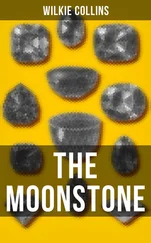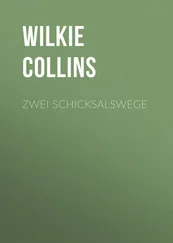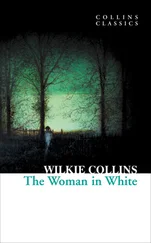Wilkie Collins - The Moonstone
Здесь есть возможность читать онлайн «Wilkie Collins - The Moonstone» — ознакомительный отрывок электронной книги совершенно бесплатно, а после прочтения отрывка купить полную версию. В некоторых случаях можно слушать аудио, скачать через торрент в формате fb2 и присутствует краткое содержание. Год выпуска: 2006, Жанр: Классическая проза, на английском языке. Описание произведения, (предисловие) а так же отзывы посетителей доступны на портале библиотеки ЛибКат.
- Название:The Moonstone
- Автор:
- Жанр:
- Год:2006
- ISBN:нет данных
- Рейтинг книги:4 / 5. Голосов: 1
-
Избранное:Добавить в избранное
- Отзывы:
-
Ваша оценка:
- 80
- 1
- 2
- 3
- 4
- 5
The Moonstone: краткое содержание, описание и аннотация
Предлагаем к чтению аннотацию, описание, краткое содержание или предисловие (зависит от того, что написал сам автор книги «The Moonstone»). Если вы не нашли необходимую информацию о книге — напишите в комментариях, мы постараемся отыскать её.
The Moonstone — читать онлайн ознакомительный отрывок
Ниже представлен текст книги, разбитый по страницам. Система сохранения места последней прочитанной страницы, позволяет с удобством читать онлайн бесплатно книгу «The Moonstone», без необходимости каждый раз заново искать на чём Вы остановились. Поставьте закладку, и сможете в любой момент перейти на страницу, на которой закончили чтение.
Интервал:
Закладка:
“You have seen a great deal of him lately,” she said. “Have you, really and truly, seen THAT?”
“Really and truly,” I answered. “I am quite certain of what will happen to-morrow. I wish I could feel as certain of what will happen to-night.”
At that point in the conversation, we were interrupted by the appearance of Betteredge with the tea-tray. He gave me another significant look as he passed on into the sitting-room. “Aye! aye! make your hay while the sun shines. The Tartar’s upstairs, Mr. Jennings—the Tartar’s upstairs!”
We followed him into the room. A little old lady, in a corner, very nicely dressed, and very deeply absorbed over a smart piece of embroidery, dropped her work in her lap, and uttered a faint little scream at the first sight of my gipsy complexion and my piebald hair.
“Mrs. Merridew,” said Miss Verinder, “this is Mr. Jennings.”
“I beg Mr. Jennings’s pardon,” said the old lady, looking at Miss Verinder, and speaking at me. “Railway travelling always makes me nervous. I am endeavouring to quiet my mind by occupying myself as usual. I don’t know whether my embroidery is out of place, on this extraordinary occasion. If it interferes with Mr. Jennings’s medical views, I shall be happy to put it away of course.”
I hastened to sanction the presence of the embroidery, exactly as I had sanctioned the absence of the burst buzzard and the Cupid’s wing. Mrs. Merridew made an effort—a grateful effort—to look at my hair. No! it was not to be done. Mrs. Merridew looked back again at Miss Verinder.
“If Mr. Jennings will permit me,” pursued the old lady, “I should like to ask a favour. Mr. Jennings is about to try a scientific experiment to-night. I used to attend scientific experiments when I was a girl at school. They invariably ended in an explosion. If Mr. Jennings will be so very kind, I should like to be warned of the explosion this time. With a view to getting it over, if possible, before I go to bed.”
I attempted to assure Mrs. Merridew that an explosion was not included in the programme on this occasion.
“No,” said the old lady. “I am much obliged to Mr. Jennings—I am aware that he is only deceiving me for my own good. I prefer plain dealing. I am quite resigned to the explosion—but I DO want to get it over, if possible, before I go to bed.”
Here the door opened, and Mrs. Merridew uttered another little scream. The advent of the explosion? No: only the advent of Betteredge.
“I beg your pardon, Mr. Jennings,” said Betteredge, in his most elaborately confidential manner. “Mr. Franklin wishes to know where you are. Being under your orders to deceive him, in respect to the presence of my young lady in the house, I have said I don’t know. That you will please to observe, was a lie. Having one foot already in the grave, sir, the fewer lies you expect me to tell, the more I shall be indebted to you, when my conscience pricks me and my time comes.”
There was not a moment to be wasted on the purely speculative question of Betteredge’s conscience. Mr. Blake might make his appearance in search of me, unless I went to him at once in his own room. Miss Verinder followed me out into the corridor.
“They seem to be in a conspiracy to persecute you,” she said. “What does it mean?”
“Only the protest of the world, Miss Verinder—on a very small scale—against anything that is new.”
“What are we to do with Mrs. Merridew?”
“Tell her the explosion will take place at nine to-morrow morning.”
“So as to send her to bed?”
“Yes—so as to send her to bed.”
Miss Verinder went back to the sitting-room, and I went upstairs to Mr. Blake.
To my surprise I found him alone; restlessly pacing his room, and a little irritated at being left by himself.
“Where is Mr. Bruff?” I asked.
He pointed to the closed door of communication between the two rooms. Mr. Bruff had looked in on him, for a moment; had attempted to renew his protest against our proceedings; and had once more failed to produce the smallest impression on Mr. Blake. Upon this, the lawyer had taken refuge in a black leather bag, filled to bursting with professional papers. “The serious business of life,” he admitted, “was sadly out of place on such an occasion as the present. But the serious business of life must be carried on, for all that. Mr. Blake would perhaps kindly make allowance for the old-fashioned habits of a practical man. Time was money—and, as for Mr. Jennings, he might depend on it that Mr. Bruff would be forthcoming when called upon.” With that apology, the lawyer had gone back to his own room, and had immersed himself obstinately in his black bag.
I thought of Mrs. Merridew and her embroidery, and of Betteredge and his conscience. There is a wonderful sameness in the solid side of the English character—just as there is a wonderful sameness in the solid expression of the English face.
“When are you going to give me the laudanum?” asked Mr. Blake impatiently.
“You must wait a little longer,” I said. “I will stay and keep you company till the time comes.”
It was then not ten o’clock. Inquiries which I had made, at various times, of Betteredge and Mr. Blake, had led me to the conclusion that the dose of laudanum given by Mr. Candy could not possibly have been administered before eleven. I had accordingly determined not to try the second dose until that time.
We talked a little; but both our minds were preoccupied by the coming ordeal. The conversation soon flagged—then dropped altogether. Mr. Blake idly turned over the books on his bedroom table. I had taken the precaution of looking at them, when we first entered the room. THE GUARDIAN; THE TATLER; Richardson’s PAMELA; Mackenzie’s MAN OF FEELING; Roscoe’s LORENZO DE MEDICI; and Robertson’s CHARLES THE FIFTH—all classical works; all (of course) immeasurably superior to anything produced in later times; and all (from my present point of view) possessing the one great merit of enchaining nobody’s interest, and exciting nobody’s brain. I left Mr. Blake to the composing influence of Standard Literature, and occupied myself in making this entry in my journal.
My watch informs me that it is close on eleven o’clock. I must shut up these leaves once more.
Two o’clock A.M.—The experiment has been tried. With what result, I am now to describe.
At eleven o’clock, I rang the bell for Betteredge, and told Mr. Blake that he might at last prepare himself for bed.
I looked out of the window at the night. It was mild and rainy, resembling, in this respect, the night of the birthday—the twenty-first of June, last year. Without professing to believe in omens, it was at least encouraging to find no direct nervous influences—no stormy or electric perturbations—in the atmosphere. Betteredge joined me at the window, and mysteriously put a little slip of paper into my hand. It contained these lines:
“Mrs. Merridew has gone to bed, on the distinct understanding that the explosion is to take place at nine to-morrow morning, and that I am not to stir out of this part of the house until she comes and sets me free. She has no idea that the chief scene of the experiment is my sitting-room—or she would have remained in it for the whole night! I am alone, and very anxious. Pray let me see you measure out the laudanum; I want to have something to do with it, even in the unimportant character of a mere looker-on.—R.V.”
I followed Betteredge out of the room, and told him to remove the medicine-chest into Miss Verinder’s sitting-room.
The order appeared to take him completely by surprise. He looked as if he suspected me of some occult medical design on Miss Verinder! “Might I presume to ask,” he said, “what my young lady and the medicine-chest have got to do with each other?”
Читать дальшеИнтервал:
Закладка:
Похожие книги на «The Moonstone»
Представляем Вашему вниманию похожие книги на «The Moonstone» списком для выбора. Мы отобрали схожую по названию и смыслу литературу в надежде предоставить читателям больше вариантов отыскать новые, интересные, ещё непрочитанные произведения.
Обсуждение, отзывы о книге «The Moonstone» и просто собственные мнения читателей. Оставьте ваши комментарии, напишите, что Вы думаете о произведении, его смысле или главных героях. Укажите что конкретно понравилось, а что нет, и почему Вы так считаете.










